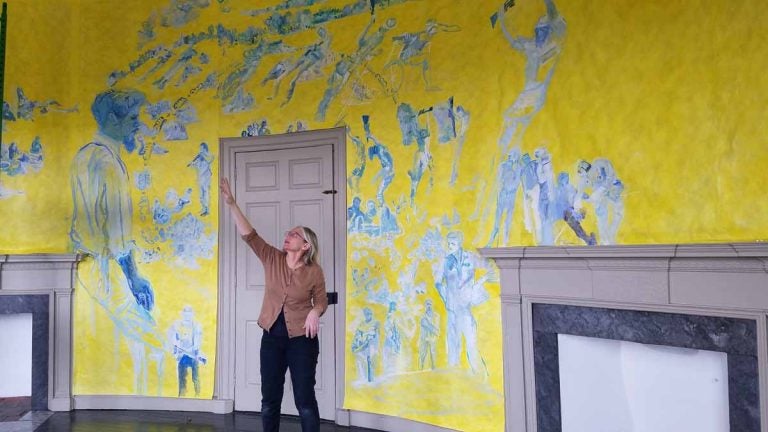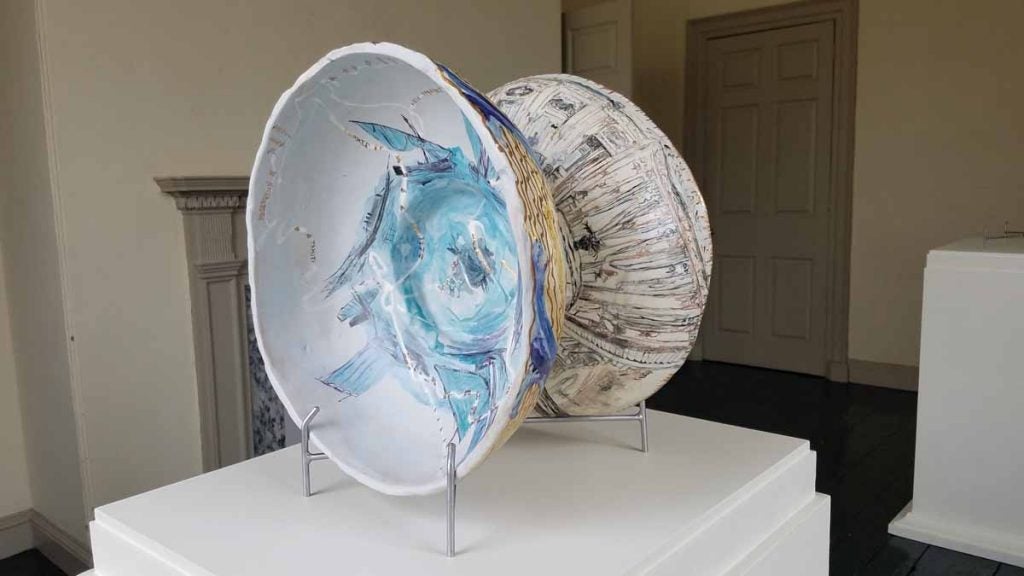Historic house in Fairmount Park redesigned as contemporary art
The Lemon Hill mansion in Philadelphia's Fairmount Park has been temporarily given over to artist Jane Irish.

Artist Jane Irish explains how she painted one of the oval rooms in the Lemon Hill mansion to depict an anti-war demonstration that took place in Valley Forge, in 1970. (Peter Crimmins/WHYY)
Philadelphia’s Lemon Hill mansion is known for its stacked oval rooms, one on top of the other. It was built in 1800 by an antiquities merchant named Henry Pratt, who likely used the impressive room to show off his wares and wow clients.
It is one of the only examples of Federalist architecture in the region with distinctive round rooms.
“The oval room is really interesting. Think of the Oval Office or Monticello. It’s very unique. It’s a beautiful Federal design, and it has to do with our ideals,” said artist Jane Irish. “I’m asking questions about that. What are our ideals now, with a contemporary artist coming in?”
The city’s Department of Parks and Recreation gave the house interior over to Irish, to coat its circular walls — floor to ceiling — with paintings representing the progress of world history and, in a bizarrely obscure twist, the nature of the cosmos.
For a few years now, Irish has been fascinated by the idea of antipodes: points on the globe that are exactly opposite one another. For example, the antipode of Philadelphia would be a spot in the middle of the Indian Ocean, just southwest of Australia.
A few years ago she started by making pairs of bowls representing two hemispheres, painted with designs of global antipodes. The decorative bowls — sometimes called foyer bowls — are displayed bottom-to-bottom, as though a globe were cut in half and the two pieces inverted.

In the fall, Irish visited the Lemon Hill mansion at the invitation of Philadelphia Contemporary, an arts presenting organization, and realized its oval rooms resemble two bowls.
Painting on muslin panels measured out to completely drape the walls of the historic room (with cutouts for doors, windows, and heating vents), Irish submerged the lower room into the Indian Ocean. Its dark underwater browns and greens are populated by flotsam and jetsam of centuries of colonialism: images of trade ships filled with ceramics, French missionaries en route to Vietnam, and movements of the slave economy.
The upper room is its antipode — Philadelphia — painted a brilliant yellow and decorated with ink drawings of Vietnam veterans protesting the war in 1970 at Valley Forge. Drawings of that Labor Day weekend demonstration were recreated from photographs.

“It begins with a dark renaissance and about colonialism,” she explained. “Then you walk up the spiral staircase, almost like a scientific model, and upstairs, it’s all yellow and about the peace movements in Philadelphia.”
The meaning is dense and complicated: the antipodes structure, the colonialist history of the Indian Ocean, and the American peace movement are all informed by an Edgar Allan Poe prose-poem, “Eureka,” wherein he offers a theory — without scientific backing — about the nature of the universe.
“The end of ‘Eureka’ is surprising. It is this joyous ecstasy of repetitive beauty,” she said. “I wanted to have the audience experience that.”
The manifold layers of Irish’s installation can be challenging to interpret, but it’s what the city’s Parks and Recreation Department wants for its historic site. Until a few years ago, the Lemon Hill mansion was managed by the Colonial Dames, a historic appreciation organization with a more straightforward interpretation of the house. They filled it with period furniture accurate to its 19th-century heyday.
When the Colonial Dames left, they took their furniture with them. Now department officials are rethinking how to use the house as a public amenity. Until a plan is hammered out, they hope events like this contemporary art installation will draw new audiences to the house perched on a verdant hill overlooking the Schuylkill River.
“It’s, like, walking into a painting, almost. Or, walking into one of these bowls. Or walking into an artist’s idea of color,” said Irish. “Which is kind of cool.”
WHYY is your source for fact-based, in-depth journalism and information. As a nonprofit organization, we rely on financial support from readers like you. Please give today.





